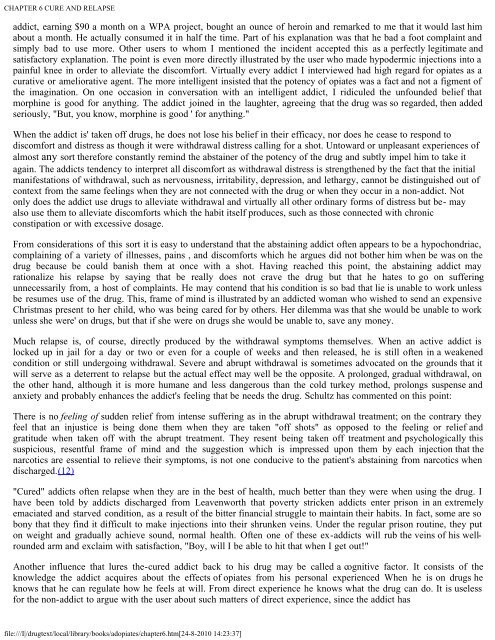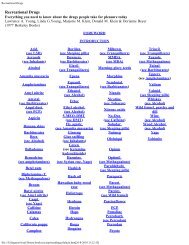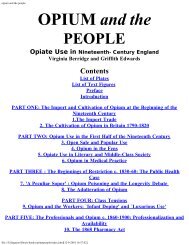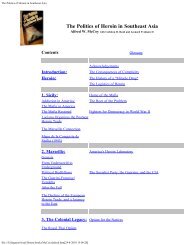Addiction and Opiates
Addiction and Opiates
Addiction and Opiates
You also want an ePaper? Increase the reach of your titles
YUMPU automatically turns print PDFs into web optimized ePapers that Google loves.
CHAPTER 6 CURE AND RELAPSE<br />
addict, earning $90 a month on a WPA project, bought an ounce of heroin <strong>and</strong> remarked to me that it would last him<br />
about a month. He actually consumed it in half the time. Part of his explanation was that he bad a foot complaint <strong>and</strong><br />
simply bad to use more. Other users to whom I mentioned the incident accepted this as a perfectly legitimate <strong>and</strong><br />
satisfactory explanation. The point is even more directly illustrated by the user who made hypodermic injections into a<br />
painful knee in order to alleviate the discomfort. Virtually every addict I interviewed had high regard for opiates as a<br />
curative or ameliorative agent. The more intelligent insisted that the potency of opiates was a fact <strong>and</strong> not a figment of<br />
the imagination. On one occasion in conversation with an intelligent addict, I ridiculed the unfounded belief that<br />
morphine is good for anything. The addict joined in the laughter, agreeing that the drug was so regarded, then added<br />
seriously, "But, you know, morphine is good ' for anything."<br />
When the addict is' taken off drugs, he does not lose his belief in their efficacy, nor does he cease to respond to<br />
discomfort <strong>and</strong> distress as though it were withdrawal distress calling for a shot. Untoward or unpleasant experiences of<br />
almost any sort therefore constantly remind the abstainer of the potency of the drug <strong>and</strong> subtly impel him to take it<br />
again. The addicts tendency to interpret all discomfort as withdrawal distress is strengthened by the fact that the initial<br />
manifestations of withdrawal, such as nervousness, irritability, depression, <strong>and</strong> lethargy, cannot be distinguished out of<br />
context from the same feelings when they are not connected with the drug or when they occur in a non-addict. Not<br />
only does the addict use drugs to alleviate withdrawal <strong>and</strong> virtually all other ordinary forms of distress but be- may<br />
also use them to alleviate discomforts which the habit itself produces, such as those connected with chronic<br />
constipation or with excessive dosage.<br />
From considerations of this sort it is easy to underst<strong>and</strong> that the abstaining addict often appears to be a hypochondriac,<br />
complaining of a variety of illnesses, pains , <strong>and</strong> discomforts which he argues did not bother him when be was on the<br />
drug because be could banish them at once with a shot. Having reached this point, the abstaining addict may<br />
rationalize his relapse by saying that be really does not crave the drug but that he hates to go on sufferingunnecessarily<br />
from, a host of complaints. He may contend that his condition is so bad that lie is unable to work unless<br />
be resumes use of the drug. This, frame of mind is illustrated by an addicted woman who wished to send an expensive<br />
Christmas present to her child, who was being cared for by others. Her dilemma was that she would be unable to work<br />
unless she were' on drugs, but that if she were on drugs she would be unable to, save any money.<br />
Much relapse is, of course, directly produced by the withdrawal symptoms themselves. When an active addict is<br />
locked up in jail for a day or two or even for a couple of weeks <strong>and</strong> then released, he is still often in a weakened<br />
condition or still undergoing withdrawal. Severe <strong>and</strong> abrupt withdrawal is sometimes advocated on the grounds that it<br />
will serve as a deterrent to relapse but the actual effect may well be the opposite. A prolonged, gradual withdrawal, on<br />
the other h<strong>and</strong>, although it is more humane <strong>and</strong> less dangerous than the cold turkey method, prolongs suspense <strong>and</strong><br />
anxiety <strong>and</strong> probably enhances the addict's feeling that be needs the drug. Schultz has commented on this point:<br />
There is no feeling of sudden relief from intense suffering as in the abrupt withdrawal treatment; on the contrary they<br />
feel that an injustice is being done them when they are taken "off shots" as opposed to the feeling or relief <strong>and</strong><br />
gratitude when taken off with the abrupt treatment. They resent being taken off treatment <strong>and</strong> psychologically this<br />
suspicious, resentful frame of mind <strong>and</strong> the suggestion which is impressed upon them by each injection that the<br />
narcotics are essential to relieve their symptoms, is not one conducive to the patient's abstaining from narcotics when<br />
discharged.(12)<br />
"Cured" addicts often relapse when they are in the best of health, much better than they were when using the drug. I<br />
have been told by addicts discharged from Leavenworth that poverty stricken addicts enter prison in an extremely<br />
emaciated <strong>and</strong> starved condition, as a result of the bitter financial struggle to maintain their habits. In fact, some are so<br />
bony that they find it difficult to make injections into their shrunken veins. Under the regular prison routine, they put<br />
on weight <strong>and</strong> gradually achieve sound, normal health. Often one of these ex-addicts will rub the veins of his wellrounded<br />
arm <strong>and</strong> exclaim with satisfaction, "Boy, will I be able to hit that when I get out!"<br />
Another influence that lures the-cured addict back to his drug may be called a cognitive factor. It consists of the<br />
knowledge the addict acquires about the effects of opiates from his personal experienced When he is on drugs he<br />
knows that he can regulate how he feels at will. From direct experience he knows what the drug can do. It is useless<br />
for the non-addict to argue with the user about such matters of direct experience, since the addict has<br />
file:///I|/drugtext/local/library/books/adopiates/chapter6.htm[24-8-2010 14:23:37]





